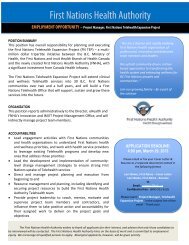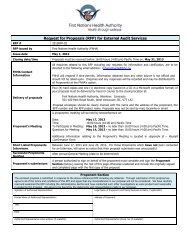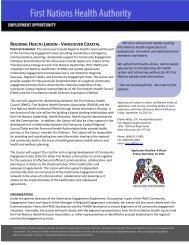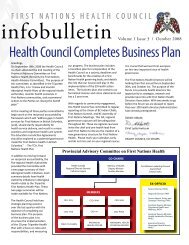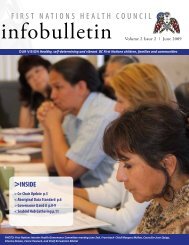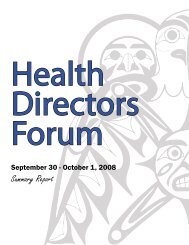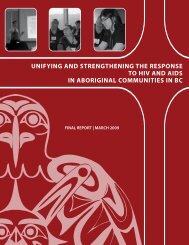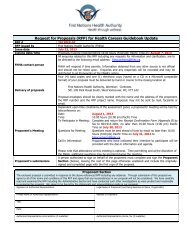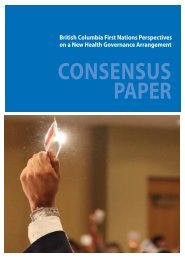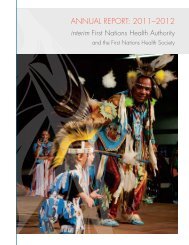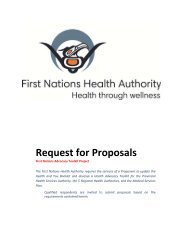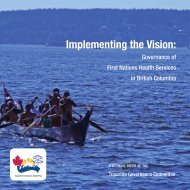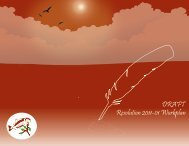pdf download - First Nations Health Council
pdf download - First Nations Health Council
pdf download - First Nations Health Council
You also want an ePaper? Increase the reach of your titles
YUMPU automatically turns print PDFs into web optimized ePapers that Google loves.
22<br />
• Need to identify policies and regulations in the<br />
system that inhibits creative ways of addressing<br />
mental health and addictions issues (e.g. Folks<br />
on mental health medication cannot enter<br />
addictions treatment programs).<br />
• Needs and capacity of communities vary<br />
greatly and there needs to be the flexibility<br />
for tailoring an approach to mental health<br />
services as well as support to the community<br />
to even develop what they think they need (the<br />
program needs to fit the community not the<br />
community fit the programs).<br />
Key Components<br />
• Need to find a way to capture the wisdom<br />
and traditions of our aging elders, more value<br />
needs to be placed on traditional medicine and<br />
practices (culture/tradition = mental health)<br />
• Need to put in place better process (wrap<br />
around services) for when individuals are<br />
discharged from hospital of treatment<br />
programs.<br />
• Need to address the ability of rural<br />
communities to access qualified mental health<br />
staff and resources.<br />
• Need to address the mental health knowledge/<br />
awareness of family members, community<br />
members and staff from many other social<br />
programs who often end up with mental health<br />
clients (e.g. maternal health staff work with<br />
pregnant mom with a mental health issue).<br />
Access for People with Disabilities<br />
Advocates have consistently urged that<br />
the needs and circumstances of Aboriginal<br />
peoples living with disabilities be included in the<br />
discussions and strategies, in not only health, but<br />
in all aspects of life. A specific discussion table was<br />
convened to examine how to ensure that people<br />
with disabilities aren’t overlooked in the work<br />
to improve the health outcomes of <strong>First</strong> <strong>Nations</strong><br />
people.<br />
How to ensure they’re not overlooked?<br />
• Give persons with disabilities a forum to give<br />
input on what they require<br />
• Support/create advocacy and build capacity for<br />
self-advocacy<br />
• Provide more thorough and consistent criteria<br />
– provide better definitions around disabilities<br />
• Create community “hubs” for people to come<br />
together for information on disabilities and<br />
activities<br />
How to incorporate into TFNHP?<br />
• This topic needs to be addressed by chiefs and<br />
council<br />
• Give the disabled a FORmAl voice –someone<br />
at the governance table who specifically speaks<br />
for true disabled community members<br />
Universal ECD Supports<br />
Both the federal and provincial governments<br />
have been engaged in initiatives to support<br />
Aboriginal Early Childhood Development. While<br />
the 2005 and 2006 federal budgets announced<br />
significant investments in <strong>First</strong> <strong>Nations</strong> early<br />
learning and child care there has been a consistent<br />
concern that funding and other supports<br />
are inadequate to address the level of need,<br />
particularly for children with special needs, in<br />
on and off-reserve <strong>First</strong> <strong>Nations</strong> communities. In<br />
the area of ‘universal ECD supports’ the FNHC is<br />
analyzing current ECD programs and services as<br />
part of determining the minimum standards for<br />
programs and services that are needed to allow<br />
<strong>First</strong> <strong>Nations</strong> children reach their full potential.<br />
Participants examined what aspects of ECD need to<br />
be addressed by the FNHC within the TFNHP:<br />
Issues and Considerations<br />
Status is an issue – some services are not<br />
funded for non-status<br />
• On reserve/off-reserve (e.g. would be good to<br />
be able to amalgamate)<br />
• Training and education for educators, families<br />
and communities<br />
• Reconsider subsidy cutoff level and level of<br />
support<br />
• Cannot only focus on children – need to<br />
support family with basic necessities - need a<br />
variety of programs accessible to families and<br />
kids<br />
How can FNHC support work of universal ECD?<br />
• FNHC could advocate for ECD funding,<br />
especially for smaller communities.<br />
• FNHC could encourage communities and<br />
create awareness of benefits so communities<br />
would include this in health plans and lobby for<br />
programs. Preventative potential is huge.<br />
II<br />
SECONd ANNUAl FORUm



